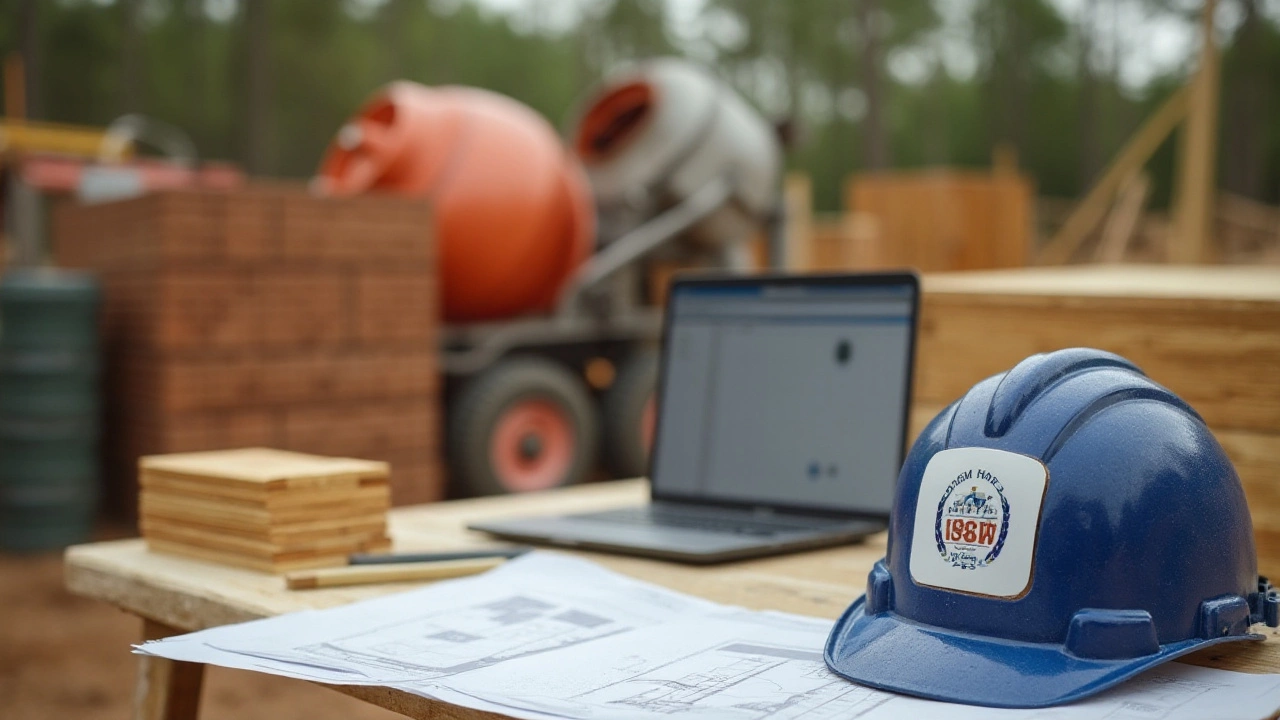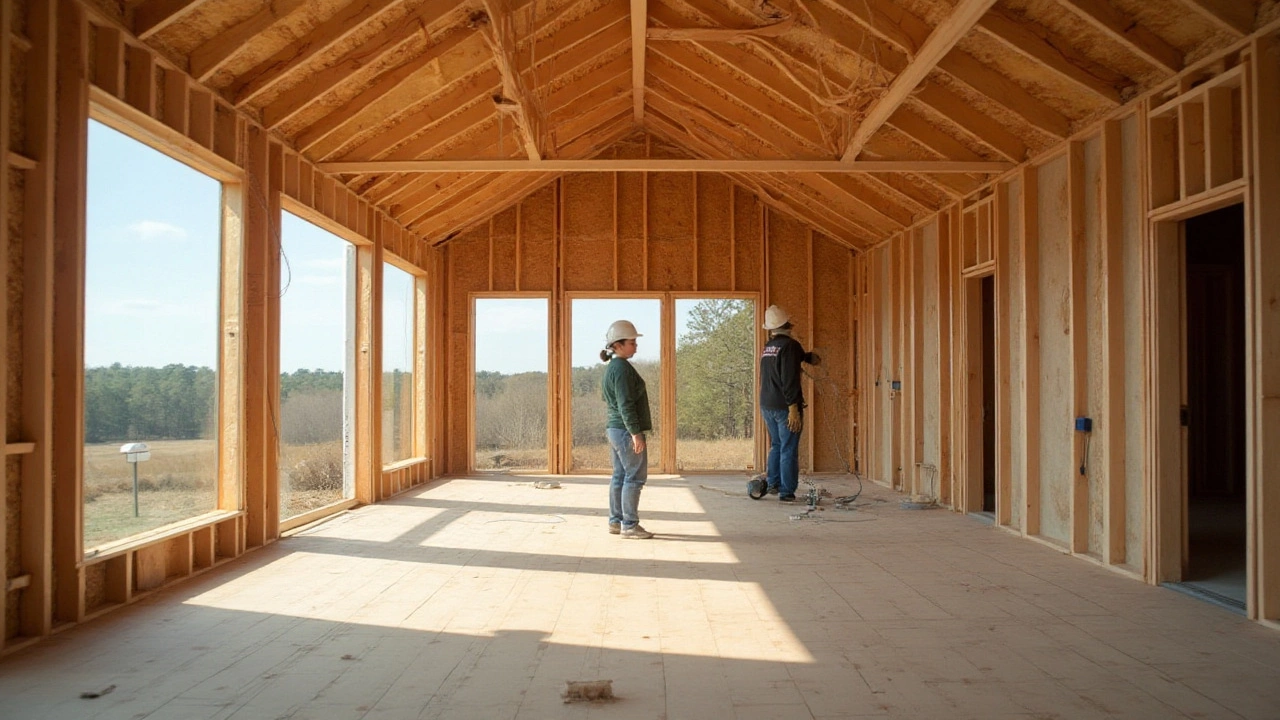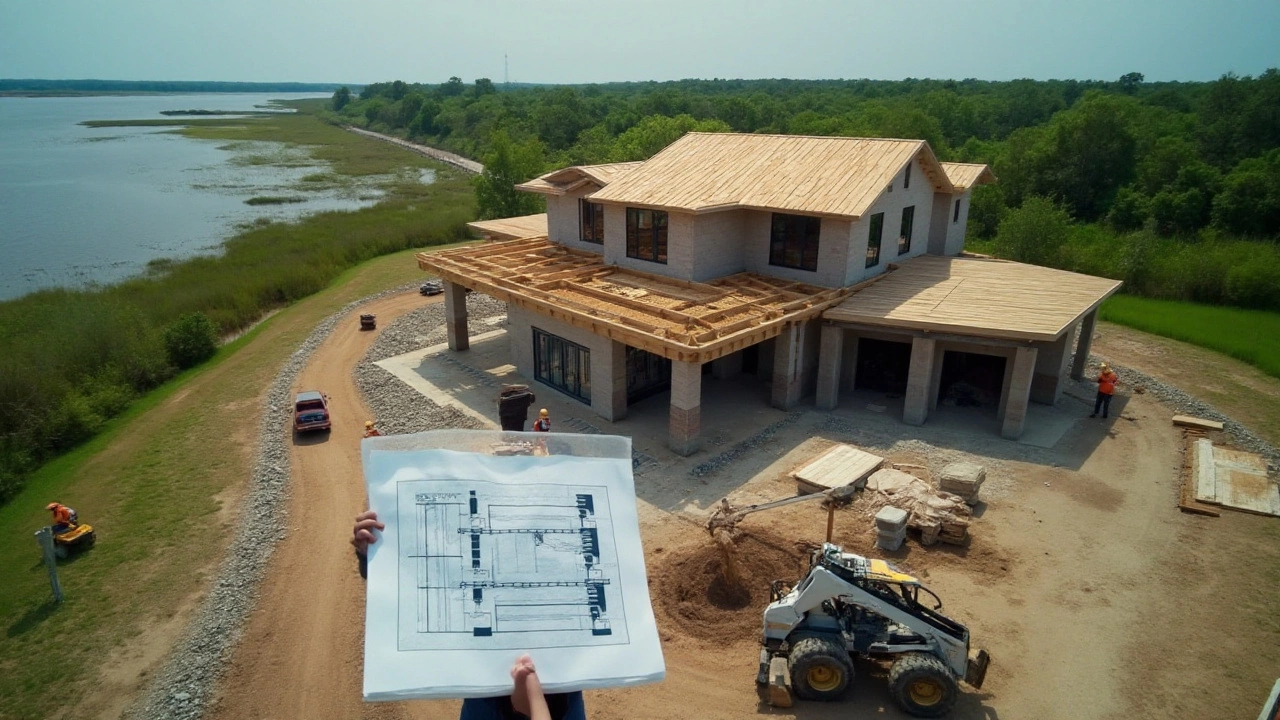Embarking on the journey to build a 3,000-square-foot house in Louisiana offers both excitement and challenges. With diverse cultural influences and unique environmental conditions, Louisiana presents distinct opportunities and considerations for homeowners. As you delve into this world, understanding costs from the ground up becomes essential.
The complexities of construction costs are woven into various threads like materials, labor, and regional regulations. Each element has its role in shaping the overall expense of your project. But fear not, with a clear blueprint and some insightful guidance, you can lay the foundation for a financially sound construction endeavor.
Whether you're dreaming of sprawling verandas reminiscent of the Old South or envisioning sleek modern lines that echo contemporary tastes, planning wisely and strategically can make your dream home a reality. Let’s take a closer look at what it takes to bring your vision to life beneath the Louisiana skies.
- Foundation and Framing Costs
- Materials and Finishes
- Labor and Contractor Fees
- Permits and Regulations
- Tips for Cost Efficiency
Foundation and Framing Costs
Building the foundation and framing of a 3,000 sq ft house in Louisiana is where the construction process truly begins, and interestingly, everyone's journey starts from the ground up. As the backbone of your home, this stage takes a substantial portion of your budget. Typically, the cost for laying a foundation in Louisiana ranges from $4 to $8 per square foot. For a home of this size, you'll be looking at a rough estimate between $12,000 and $24,000. The type of foundation—slab, crawlspace, or basement—can significantly affect these numbers, with crawlspaces and basements often costing more due to additional materials and labor required.
Framing is the next crucial step, and here is where the skeleton—the very bones of your home—comes to life. Available timber resources in Louisiana influence framing choices, with southern pine often used for its strength and availability. The price for framing generally lands between $9 and $18 per square foot. Considering your 3,000 square foot palace, it's wise to budget anywhere from $27,000 to $54,000. Keep in mind factors such as complexity of design, which can push costs higher when dealing with ornate or custom specifications.
A notable aspect of these early stages is their dynamic nature—cost can quickly escalate with changes in plan or unforeseeable challenges like soil instability. It’s advisable to account for a 10-20% contingency fund to cushion any surprises. As a respected local architect once said, “Every strong fortress begins with a solid foundation,” a fitting reminder of the importance and meticulousness required during this phase. Investing time in soil tests and site evaluations ensures the selection of appropriate materials and techniques, setting a firm base for your dream home.
Recent statistics note that labor rates in Louisiana are moderately priced, yet skilled framers bring invaluable expertise to efficiently handle regional idiosyncrasies like subsidence or humidity issues. Hiring local specialists familiar with the state’s unique landscape can enhance the quality of the build. A comparative analysis of foundation and framing costs across states places Louisiana in a competitive position, often slightly lower than higher-priced markets like California or New York. Here's a peek into cost variances:
| State | Foundation Cost per Sq Ft | Framing Cost per Sq Ft |
|---|---|---|
| California | $10 | $20 |
| Louisiana | $6 | $13 |
| New York | $11 | $21 |
It's clear that starting from the soil up is a journey filled with decisions steeped in professional judgment and personal preference. Understanding these costs early empowers you to steward your resources wisely, and to visualize your future haven emerging from the fertile grounds of the bayou state.
Materials and Finishes
When building a 3,000 sq ft house in the heart of Louisiana, choosing the right materials and finishes is crucial. The local climate, characterized by humidity and occasionally harsh weather, demands materials that can endure these conditions. For instance, opting for materials like treated wood or weather-resistant vinyl siding might be prudent choices for the exterior. These materials not only offer durability but also help maintain the structural integrity of your home over time. The exterior finishes, ranging from brick facades to sleek stucco, each lend a different aesthetic charm, resonating with the vibrant culture of Louisiana.
Inside, the choice of materials for flooring, walls, and ceilings can significantly impact both the cost and the ambiance of the home. Hardwood floors, while a bit more expensive than alternatives like laminate or vinyl, provide timeless elegance and are often worth the investment due to their longevity and appeal. Likewise, drywall is a common choice for interior walls, but there's a growing trend towards plaster, which offers a smoother finish and a touch of luxury. As for the ceiling, coffered styles are becoming increasingly popular in upscale Louisiana homes, adding depth and architectural interest.
Finishes are where you add personal style, and they tie together the entire design of the house. The choice of paint or wallpaper, types of cabinetry, and even fixture styles in kitchens and bathrooms often reflect the homeowners' lifestyle and personal taste. Many homeowners in Louisiana lean towards finishes that echo the historical richness of the state, integrating elements like wrought iron details or antique brass fixtures.
"The finishes you choose are like the punctuation at the end of the story of your home," says renowned architect Frank Lloyd Carey. "They complete the narrative and give character to the spaces where you live your daily life."
Balancing aesthetics with costs involves smart choices. Kitchen counters, for instance, can range dramatically in price and durability. While granite remains a beloved choice for its resilience and natural beauty, engineered quartz has gained traction for offering similar advantages can fit a tighter budget. Similarly, in bathrooms, the trend of using large-format tiles is growing. These not only enhance the visual appeal by making spaces look more expansive but are also easier to clean and maintain, reducing upkeep costs in the long run.
Let's not overlook sustainable and environmentally friendly options, which are becoming increasingly popular among conscientious homeowners looking at new home construction. Bamboo and reclaimed wood are finding their way into homes as flooring options. These not only appeal to the environmentally aware but also fit into the unique ecological narrative of Louisiana. There's something grounding about constructing a home that resonates with the rhythms and organic beauty of its surroundings.
Budget Considerations and Tips
Successfully navigating the myriad of choices requires a balance between preference and practicality. Consulting local experts or hiring a professional interior designer can save a considerable amount of time and potential frustration. They have the knack for sourcing both aesthetically pleasing and cost-effective materials. It's also wise to keep an eye on sales and bargain events, where top-rated materials like house building cost traditionally expensive marble tiles might be available at reduced prices.
Ultimately, thoughtful selection of materials and finishes not only adds to the new home construction aesthetics but also influences maintenance costs, energy efficiency, and resale value. By taking a comprehensive approach and prioritizing key areas like the kitchen and master bathroom, homeowners can enjoy both up-to-date convenience and the timeless appeal that resonates with the Southern charm of Louisiana living. So, as you plan your 3,000 sq ft sanctuary, let your creativity flow, guided by informed choices and the cultural inspiration surrounding you. Your dream home is not just an insulated shell; it's a canvas reflecting your personal story, standing strong amidst the lush landscapes of Louisiana.

Labor and Contractor Fees
In the scope of building a 3,000 sq ft house in Louisiana, labor and contractor fees represent a significant portion of your budget. Enlisting the expertise of skilled professionals is crucial to ensure quality and timely completion. The costs can vary based on contractor reputation, project complexity, and even the season. When a project is initiated during a high-demand period, labor costs may rise due to contractor availability. It's important to consider these cycles to manage your budget effectively.
The selection of a general contractor often guides the course of the entire construction process. A seasoned contractor proficient with Louisiana's building codes and cultural nuances can be an invaluable asset. They typically charge a percentage of the total project cost, usually ranging from 10% to 20%. This includes site management, coordination of subcontractors for specialized tasks such as plumbing and electrical work, and overseeing the project timeline.
For home builders, it's beneficial to delve into the finer points of contract agreements. Defining clear scopes of work and payment schedules can prevent unforeseen expenses. Engaging multiple quotes and getting references from past clients can also provide a wider perspective on pricing and work quality. One experienced builder might say,
"The true measure of success is when the project sails smoothly past inspection days with approval on the first go."This not only stays true to quality but also keeps unexpected fines and delays at bay.
While getting your dream home erected in Louisiana, it's equally essential to enable effective communication lines with your contractor. Transparency in the project timeline, from groundbreaking to finishing, ensures both parties have aligned expectations. Sometimes, investing in a professional project manager can streamline operations, saving you in the long run by avoiding costly errors. Remember, the allure of lower bids shouldn't overshadow the promise of stellar workmanship, as repairs might cost more in subsequent years.
When navigating labor prices, retain some flexibility. Unforeseen economic events or natural occurrences like hurricanes may impact the availability of resources and workforce. Having a contingency plan or buffer in your budget can mitigate these risks. After all, being prepared transforms potential mishaps into mere bumps along the home's creation path, echoing Southern resilience.
Permits and Regulations
Before breaking ground on your Louisiana dream home, navigating the maze of permits and regulations becomes a pivotal step. This isn't just about ticking boxes but ensuring your project is legally sound and adheres to state-specific guidelines. Each parish, akin to what other states might call counties, has its own nuanced rules, which means a one-size-fits-all approach won't work. From ensuring your home meets zoning laws to adhering to environmental regulations, these steps are indispensable in the building process.
For instance, Louisiana's unique topography and often volatile weather patterns mean that considerations such as flood zone risks must be accounted for. It's crucial to determine if your property lies in a designated flood zone, which influences the type of foundation you might need and even the insurance requirements. Typically, acquiring a building permit is the first major step. This involves submitting detailed plans that likely need to cover everything from the footprint of your home to specific details about the plumbing and electricity setups. Local building codes ensure that homes are safe and up to standard, a safeguard for both you and the broader community.
Engagement with the Louisiana Department of Transportation and Development might also be necessary, especially if your property borders a state highway or involves changes to the existing infrastructure. Environmental regulations can further impact your build, given the state's commitment to preserving its distinct ecosystems. Building in ecologically sensitive areas may require additional approvals, with thorough assessments to guard against adverse effects on the environment. This is not merely bureaucratic red tape but a way to ensure the protection of Louisiana's natural beauty.
"Before diving into a new build, it's essential to verify local requirements and maintain ongoing communication with experienced professionals," advises Landon Brooks, a seasoned building contractor based out of Baton Rouge.
Fees for permits are another element to consider, and they can vary widely based on location, the scope of your project, and even the size of the home you're planning to build. Budgeting for these expenses from the outset can prevent financial surprises down the road. If this sounds daunting, hiring a local contractor with a proven track record and an understanding of your parish's regulations can be invaluable. They can often offer guidance and handle a good deal of the legwork concerning permits, saving homeowners significant time and trouble.
As you move through the permitting process, ongoing inspection requirements will surface, designed to ensure compliance at every phase of construction. From foundation pours to framing and electrical inspections, each stage requires sign-off before moving forward. Keeping diligent records and maintaining a dialogue with inspectors can facilitate a smoother and potentially expedited process. This meticulous attention span can lead to not only a successful build but also peace of mind, knowing everything meets house building cost standards in Louisiana.

Tips for Cost Efficiency
Building a house in Louisiana can be a rewarding pursuit, but staying on budget requires strategic planning and savvy decision-making. A primary approach to achieving this involves being flexible with your design plans. While the allure of intricate architectural details can be strong, simplifying the design might offer significant savings without compromising on aesthetics. Consider open floor plans, which not only minimize construction complexities but also create airy and inviting living spaces. Engaging with an architect who understands both your vision and financial limits is crucial. They can guide you to choose designs that blend elegance with practicality, saving costs without cutting corners.
Another key for cost efficiency lies in selecting the right materials. Opting for locally sourced materials when possible isn't just an environmental choice; it can also lead to substantial savings by reducing transportation costs. The climate in Louisiana with its humidity and sometimes harsh weather conditions makes it wise to invest in materials that are durable and low-maintenance. For instance, choosing metal roofing over traditional shingles can be more expensive at the onset but cuts down on long-term repair costs due to its durability. Evaluating the long-term savings versus the initial expense is pivotal.
Finding a reputable contractor can also immensely impact cost management. A contractor who offers transparent pricing and has a good grasp of the local market can be your most valuable asset. When comparing bids, it's not just about the bottom line; look for contractors who offer detailed estimates, including potential allowances for unforeseen expenses. It might be tempting to go with the lowest bid, but quality of work and reliability should weigh heavily in your decision. Seeking testimonials from former clients and checking a contractor’s credentials can provide assurance that you're making a wise choice.
"The true cost of construction doesn't just lie in dollars and cents, but in the peace of mind that comes with knowing the job is done right," as noted by industry expert James Fletcher.
Staying on budget is also about being smart with energy efficiency from the get-go. Items like high-efficiency windows, proper insulation, and modern HVAC systems can reduce long-term utility costs—an especially important consideration given Louisiana's climate extremes. Though the initial expenditure might seem hefty, investing in these elements often qualifies homeowners for tax incentives, adding another layer of cost savings. It's also worth discussing potential green energy solutions, such as incorporating solar panels or geothermal heating, with your contractor to ensure that they're viable for your location and intended house plan.
Additionally, plan your purchase timeline strategically. Sometimes, simply buying materials during sales or discounts can save significant costs. Aligning bulk purchases with seasonal discounts can make a substantial difference, as does negotiating terms with suppliers for reduced rates in exchange for larger purchases. Understanding that cash flow and budgeting are closely tied, having a meticulous financial plan with a buffer for emergencies adds another layer of security. Proper bookkeeping can help keep an eye on spending, but a proactive approach with regular financial reviews can preemptively address areas where costs might be escalating.
Lastly, an often underrated aspect of cost-saving is timing your construction project wisely. Building during high-demand seasons can escalate costs due to workforce demand and supply shortages. Instead, aim for off-peak times when contractors might be more willing to negotiate rates, and material costs may be more favorable. Choosing the right season for specific construction tasks can also save money. Louisiana's seasonal weather variations mean timing tasks like roofing or foundation pouring can help avoid weather-induced setbacks and their associated costs.

